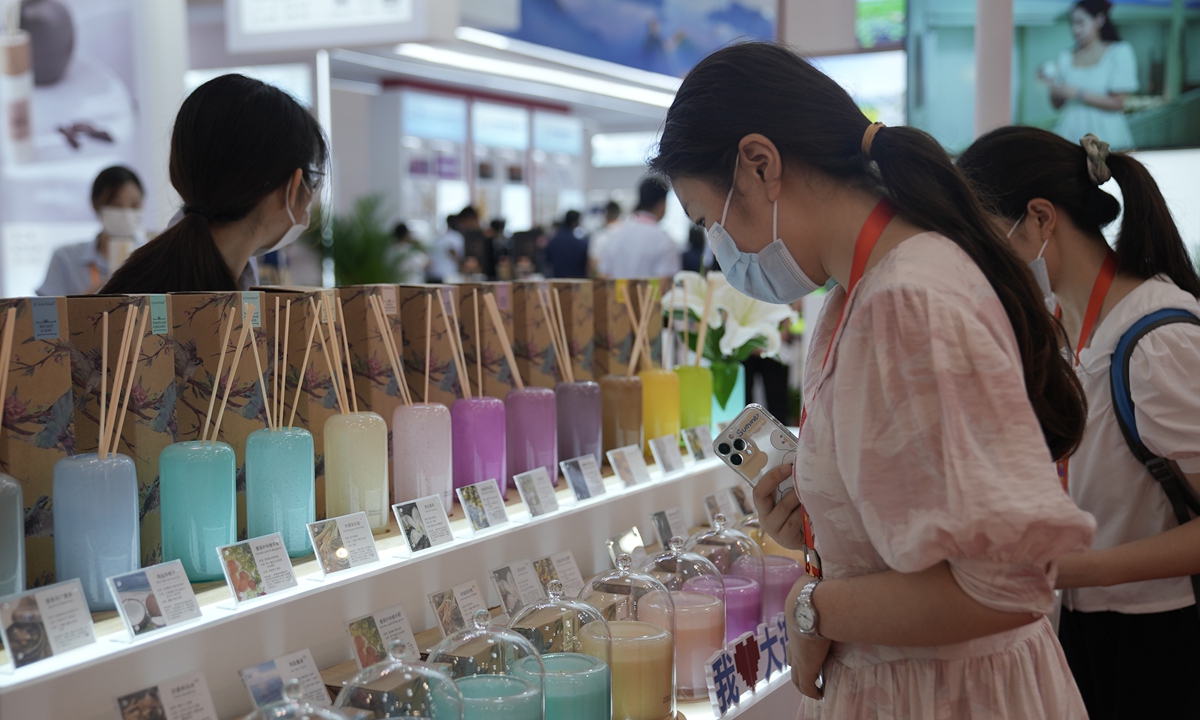
Visitors stop at a scent booth at the Second China International Consumer Products Expo in Haikou, South China's Hainan Province on July 25, 2022. This year, the expo features a domestic section and an international section of more than 100,000 square meters, up 25 percent compared with the first session last year. Photo: Liu Xiaojing/Global Times
The second China International Consumer Products Expo (CICPE), said to be Asia's largest consumer product expo, kicked off in Haikou, South China's Hainan Province on Monday, with strong participation from domestic and global corporations that underscores solid confidence in the robust recovery of China's consumer market.
The annual expo, which is being held amid multiple domestic and foreign complexities, is seen as charting a robust consumption recovery, as the event enables multinationals to fast-track their Chinese ambitions and helps homegrown consumer items to explore international opportunities.
In a keynote speech to the opening ceremony of the CICPE in Haikou, Leung Chun-ying, vice chairman of the National Committee of the Chinese People's Political Consultative Conference (CPPCC), stated that changes confronting the world are unseen in a century, compounded by the COVID-19 pandemic.
These have weighed on the global consumption recovery, but the size of China's consumer market continues to expand with a sustained upgrading.
The fundamentals of the Chinese economy with strong resilience, enormous potential, vast room for maneuver and long-term stability remain unchanged, Leung said, stressing that "we're filled with optimism over the prospects of China's economic development."
The second consumer expo dovetails with a global call for opening-up and partnerships, he continued, urging an open-minded and tolerant approach to growth for there to be expanded global trade.
The consumer expo runs until Saturday. The expo offers a significant platform for global firms to explore the Chinese market, and it also helps channel Chinese products into the international market, thereby underpinning a sustained recovery in consumption, Wang Shouwen, China's international trade representative and vice commerce minister, said in remarks to the opening ceremony.
The international exhibition area totals 80,000 square meters this year, accounting for 80 percent of the total exhibition space. More than 1,000 overseas firms and over 1,600 brands have subscribed for the six-day expo.
The domestic exhibition area hit 20,000 square meters, with upwards of 1,200 brands from 31 Chinese provinces and regions and the Xinjiang Production and Construction Corps attending.
Notably, the latest Chinese tech products, green and smart home appliances, and other indigenous offerings, were on display at a 5,000-square-meter boutique pavilion for homegrown products.
China is the world's second-largest consumer market. Retail sales amounted to 44.1 trillion yuan ($6.54 trillion) in 2021, more than doubled compared with 2012.
Although domestic consumption has been under pressure from sporadic Omicron outbreaks, a raft of pro-growth policy measures, including incentives tailored for purchases of cars and green and smart home appliances, has turned out to be effectively reversing course.
In June, consumer spending staged a remarkable comeback, with retail sales growing 3.1 percent from the year before, reversing a 6.7 percent decline in May, data from the National Bureau of Statistics showed.
Among the vibrant foreign attendance at this year's consumer expo were members of the Regional Comprehensive Economic Partnership (RCEP), including Japan, South Korea, Australia and Thailand.
Japanese participants' enthusiasm is running high for this year's expo as Japanese exports to China are subject to lower tariffs under the RCEP framework.
If the tariffs are cut to zero, Japanese products are set to see a huge presence in the Chinese market in sales terms and accordingly no one could afford to miss out on such opportunities, Jin Guang, manager at the Guangzhou representative office of the Japan External Trade Organization, told the Global Times during the expo on Monday.
Meanwhile, the Irish embassy in China organized businesses to attend the consumer expo for the second consecutive year.
Spirits sales in many European countries have taken a hit from the pandemic, but Ireland still managed to log a sales uptrend, buoyed by its active exploration of the Chinese market, a manager giving his surname as Yuan with a Chinese trade company that sells Irish whisky, told the Global Times on Monday.
"We play a positive role in China's economy and continue our efforts," LVMH greater China president Andrew Wu told reporters on the sidelines of the consumer products expo on Monday.
The fallout from COVID-19 and other short-term challenges facing the retail sector in China do not change the group's long-term commitments to the Chinese market, Wu said, noting that LVMH remains upbeat about young Chinese consumers.
On behalf of LVMH's perfumes and cosmetics division, Wu signed a memorandum of cooperation with Vice Mayor of Haikou Lu Min on Monday during the expo, further preparing for related supply chain development in Haikou to support future business growth.
The French conglomerate registered a fully owned perfumes and cosmetics subsidiary in Hainan in March and had by the end of June finalized its first batch of import shipments.
On the part of domestic exhibitors hoping for expanded outreach, the Hainan expo is also a rarity, along with the China International Import Expo in Shanghai and the Canton Fair in Guangzhou, that helps local businesses anchor growth amid an overall downturn across the globe, Cheng Lihua, chairperson of a ceramics company in Jingdezhen, East China's Jiangxi Province, told the Global Times on Monday.




